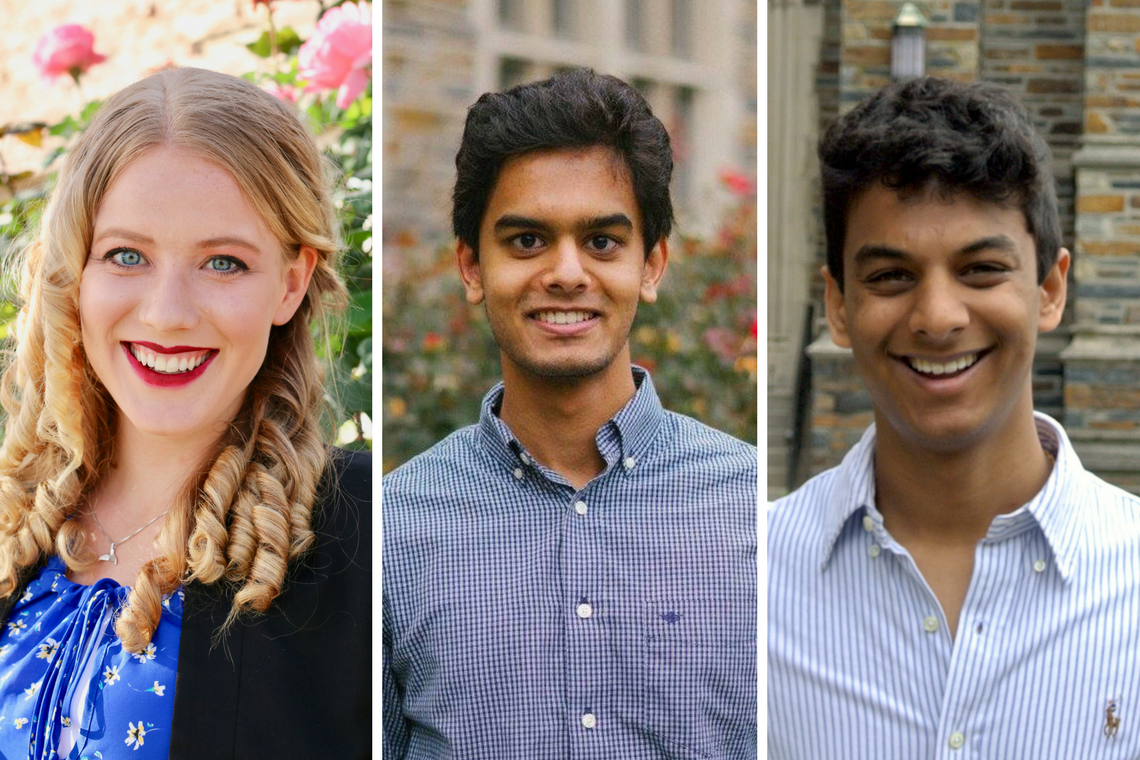Two Duke Juniors, One Sophomore Named Goldwater Scholars
Scholarships go toward the cost of tuition, fees, books, room and board

Samantha Bouchal and Shomik Verma, juniors at Duke University, and Pranav Warman, a sophomore, have been named 2018 Barry M. Goldwater Scholars by the Barry M. Goldwater Scholarship and Excellence in Education Program.
Bouchal, Verma and Warman are among 211 students awarded Goldwater Scholarships for the 2017-18 academic year. The one- and two-year scholarships go toward the cost of tuition, fees, books, room and board up to a maximum of $7,500 per year.
The Goldwater Scholars were selected on the basis of academic merit from a field of 1,280 mathematics, science and engineering students who were nominated by the institutional representatives of 455 colleges and universities nationwide. Virtually all scholars intend to obtain a Ph.D. as their degree objective.
The federally endowed scholarship program honoring the late U.S. Sen. Barry Goldwater was designed to foster and encourage outstanding students to pursue careers in the fields of mathematics, the natural sciences and engineering.
Bouchal is a neuroscience major and Angier B. Duke Scholar from Queen Creek, Arizona. During her time as an undergraduate at Duke, UConn and the Mayo Clinic, she has investigated the gut-brain connectome, the neurogenetics of dyslexia, and molecular interventions for spinal cord injury. Her current project focuses on the role of an anti-cell death protein, XIAP, in the development of brain metastases in inflammatory breast cancer patients. This work is expected to lead to a senior honors thesis.
Bouchal plans to earn a Ph.D. in neurobiology and work as a principal investigator and professor at a major research university. She aspires to mentor the next generation of neuroscientists, using what she has learned from her own mentors to help close diversity gaps in the STEM disciplines.
“Samantha has distinguished herself by demonstrating exceptional initiative, scientific ingenuity and writing skills. Her development of a project proposal examining anti-apoptotic signaling in the development of inflammatory breast cancer brain metastases demonstrated her ability to think scientifically and apply new knowledge to a complex biological problem,” said Dr. Gayathri Devi, her research mentor and principal investigator of the Cell Death Laboratory in the Department of Surgery.
Verma is a junior from Houston, studying mechanical engineering with minors in energy engineering and mathematics. He is involved in energy research and has been working for the past three semesters in the Thermodynamics and Sustainable Energy Laboratory with Nico Hotz, assistant professor of the practice in the Department of Mechanical Engineering & Materials Science. Verma hopes to obtain a doctorate in the applications of heat transfer in renewable energy and is excited about the potential of developing novel energy technologies to help solve energy challenges.
According to Hotz, “Shomik has a strong passion for research and the topic of renewable and sustainable energy and his motivation is combined with exceptional fundamental skills and analytical abilities. During my years of mentoring students and supervising their research, I have hardly ever seen a student as talented and hard working as Shomik.”
Warman, a sophomore and Angier B. Duke Scholar from Tampa, Florida, is double majoring in computer science and biology. Interested in leveraging computational and mathematical tools to better understand and solve biology’s big problems, Warman’s research topics include schizophrenia and its relapses, retinal diseases and a project in neural tissue regeneration. After Duke, Warman plans to continue researching these areas through a graduate degree.
“Despite being the youngest member of the team, Pranav has emerged as a natural leader in the project,” said Dr. Gopalkumar Rakesh, a resident with the department of psychiatry at Duke University Medical Center.
“His ability to comprehend published literature and propose steps in the project has been instrumental to the project’s progress. Despite the complexity of the tools and techniques used in this project, Pranav has provided numerous useful insights at different stages in the project that have helped the project move forward ranging from computational improvements to increase the efficiency of certain programs to suggesting non-intuitive steps that have allowed us to better understand our data and prepare us for different modeling techniques.”
Since its first award in 1989, the foundation has bestowed more than 8,132 scholarships worth approximately $63 million. Seventy Duke students have received Goldwater Scholarships since 1995. For a full list of winners and more information about the Goldwater Scholarship, visit http://goldwater.scholarsapply.org/.